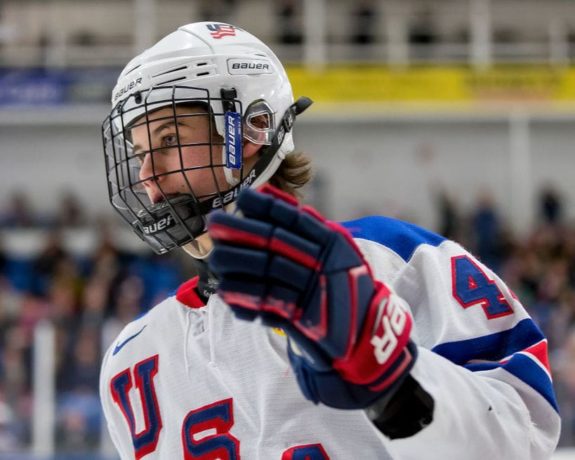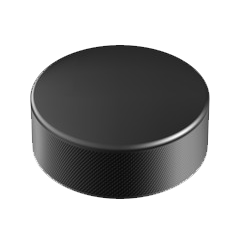We’re less than four months away from the NHL getting some long-awaited best-on-best competition, in the form of the Four Nations Face-Off. The tournament will take place from Feb. 12-20 in Montreal, Quebec and Boston, Massachusetts, in replacement of the annual All-Star festivities. And for many New Jersey Devils players, it will be an opportunity to represent their country on a massive stage.
Luke Hughes told The Hockey Writers, “You always want to be part of the Four Nations or the Olympics if you’re lucky enough to be invited.”
Since only the United States, Canada, Finland and Sweden will take part, that excludes a small chunk of Devils. But they still have 17 rostered players who would be eligible to play. Here are the possible participants:
Definite: Jack Hughes (USA)
For Jack Hughes’ standards, it’s been a slow start to the 2024-25 season. He still has 12 points in 15 games, though, and just based on talent alone he’ll make Team USA. A three-time All-Star at 23 years of age, he remains one of the elite forwards in the entire NHL.

He’ll get to be teammates with his brother Quinn, who already has been named to the roster as part of the “First Six”. Jack has previously donned the stars and stripes at the World Hockey Championship (U17), World U18s (twice), World Juniors (U20) and the Men’s World Championship. He has a remarkable 54 points in just 31 games between those tournaments.
Definite: Jesper Bratt (Sweden)
Jesper Bratt has been underrated for a very long time, but not enough to keep him off the Swedish roster, in which he’ll play a major role. He’s had three full seasons of being a near-point-per-game player and is still just 26 years old.
Bratt has suited up for Sweden at the World Hockey Championship (U17), World U18s and the Men’s World Championship. He’s never had to play as large of a role as he will at the Four Nations, though. He won silver at the 2016 U18s, notching four points in seven games.
Extremely Likely: Jacob Markstrom (Sweden)
There’s really not much debating: Jacob Markstrom has been the most successful among all active Swedish goalies. The only thing that would keep him off the team is if he completely hits a wall and other goaltenders (Samuel Ersson, Anton Forsberg or Jonas Johansson) play significantly better. It’s already assumed that Linus Ullmark will make the team but Markstrom is a clear-cut second choice.
Markstrom has suited up for Sweden eight times already: World U18s, World Juniors (U20 – twice), the World Cup of Hockey and four Men’s World Championships. He’s a combined 18-10-0 in those contests, and won a gold medal as the starter at the 2013 Men’s Worlds.
50/50: Erik Haula (Finland)
While the names mentioned above should have larger roles, if Erik Haula does make the team, it will almost certainly be for a bottom-six role. With that being said, he fits the mold of what Finnish management typically looks for: great defensively, kills penalties and has a nice scoring touch.
Related: New Jersey Devils Have 3 Options to Fill Lazar & Bastian’s Roster Spots
He’s donned the Finnish uniform on six occasions: the World Hockey Championship (U17), World U18s (twice), World Juniors, Men’s World Championship and the World Cup of Hockey. He told reporters that he didn’t want to go to the Worlds in May 2024 because “it wouldn’t be 100% with my heart,” citing some family reasons. But since Four Nations is mid-season, if everything is okay personally, this would be a great opportunity for him to get back to repping his country on a big stage.
50/50: Dougie Hamilton (Canada)
Dougie Hamilton has been on the radar of Team Canada for a while, as he was a hot topic around the 2022 Olympic roster prior to COVID-19. He’s been one of the premier offensive defensemen in the NHL, but there have been murmurs that his shaky defensive play could put him out of favor.
Canada has a stacked blue line headlined by Cale Makar, Evan Bouchard and Noah Dobson. But their depth could be better. Hamilton has suited up for Canada three times (U17 World Hockey Championship and World Juniors twice)..but not since 2013. At the 2012 World Juniors, he led all defensemen in tournament points, winning a bronze medal. He won’t play a top-four role unless there are injuries, but he could potentially serve a valuable role as an offensive threat.
Probably a Longshot: Dawson Mercer (Canada)
Canada is likely too stacked to consider Dawson Mercer, but it’s worth keeping an eye on. There’s a possibility that Canada wants a complete roster with role players instead of just a cluster of stars, and in that case, Mercer could play a valuable bottom-six role.
Dawson Mercer with a backhand beauty.😍 Canada is back in the lead.🇨🇦 #MensWorlds #CANCZE @hockeycanada @NJDevils pic.twitter.com/QVV4jtR8yP
— IIHF (@IIHFHockey) May 21, 2024
It’s also been confirmed that participation at Men’s Worlds makes a player favored by a country’s management group – and the 23-year-old Mercer has already competed there twice, with nine points in 19 games (plus-8). He’s already one of the more decorated Canadian NHLers, with a World Juniors gold (2020), World Juniors silver (2021) and Men’s Worlds silver (2022).
Probably a Longshot: Luke Hughes (USA)
The 21-year-old Luke Hughes still has some growing to do but has a bright future ahead of him. He made the NHL All-Rookie team last season and was a Calder Trophy finalist. There are plenty more seasoned, well-rounded American defensemen available, but if injuries come calling, there’s an intriguing case for the youngest Hughes.
First, his participation at the Worlds (2022 and 2024) likely has him in good hands with the American management team. Then, the promotion value of a team with all three Hughes brothers might make him worth a gamble as a seventh defenseman. He’s suited up for the Americans five times already, including the U17 World Hockey Championship and two World Juniors in addition to the Men’s Worlds.
Everyone Else: Near Impossible
Unless a country is decimated by injuries, it’s doubtful that any other Devils will be given even the slightest consideration. No matter how solid of a contributor one may be, this is the best of the best we’re talking about. It’ll be a whole decade since true best-on-best has occurred with the 2016 World Cup of Hockey. Teams are going to be all-in to try to win it and won’t cut any corners.


